Trauma-Informed Support for the Foster Care/Adoption Community
The Restore Network exists to change the culture of foster care in Illinois and equip God’s people to meet the needs of vulnerable children and youth. The children we serve have experienced relational and developmental harm that has resulted in changes to their biology, brain, body, beliefs, and behaviors. The supports and resources we offer are created to equip caregivers, volunteers, child welfare professionals, and our church partners to navigate the joys and complexities of caring for these vulnerable children. The resources we offer are based on the principles of Trust Based Relational Intervention created by the Karyn Purvis Institute of Child Development at Texas Christian University as well as other areas of attachment theory and relational neuroscience which we believe line up with how God created our brain and bodies for relationship and the design plan for human flourishing.
Episodes
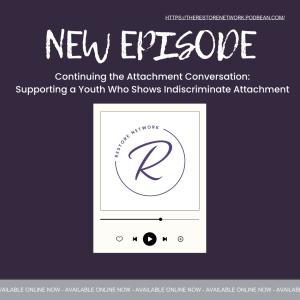
Tuesday Mar 11, 2025
Tuesday Mar 11, 2025
As we continue the conversation about building trust and secure attachment with the kids we welcome into our homes through foster care & adoption, we want to learn about something often overlooked by parents and professionals but critical to understanding our kids and mitigating future vulnerabilities for them. That thing is called indiscriminate attachment.
Do you have a youth who frequently approaches strangers, offering them more verbal or physical affection than might be appropriate?
Do you have a youth that struggles with boundaries?
Do you have a youth who has a history of being passed around a lot as an infant or young child, having a history of many different caregivers?
Do you have a youth who struggles with authority?
If so, then you may have a youth whose brain and body did not wire itself around a secure relationship with a safe adult but rather many different people and they struggle to now understand the difference between safe parental authority and other adults...seeking validation and connection with everyone...or nobody.
In this week's conversation we explain what indiscriminate attachment is, how it develops, what we can do as caregivers to help these youth grow healthy attachment to a safe person, and a tool you can use to teach healthy social skills and boundaries.
Episodes references:
Circles Tool Example: https://www.youtube.com/watch?v=jfBiZQkfPnc & https://www.youtube.com/watch?v=AsSdyDNovzs (you do not have to purchase any program-this is an example of how to talk with and teach your child about appropriate social interactions).
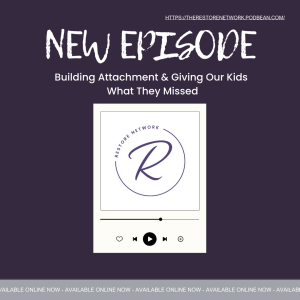
Monday Mar 03, 2025
Monday Mar 03, 2025
Moving a brain from protection mode to connection mode is as simple and as complicated as it sounds. The good news is, we have a template for where to begin. God's design plan for the start of life shows us the exact relational principles that we need for the start of our relationship with the new child we've just welcomed into our home, no matter the age. The tricky part comes in being creative and intentional on how to get those moments of relational goodness when it's a bigger kid standing in front of us! Join us for a conversation on building attachment through the relational gifts of proximity, eye contact, safe touch, playfulness, & consistently meeting needs. Then join us for more on this topic next week!
Episode References:
The Birth of Your Relationship: https://therestorenetwork.org/the-birth-of-your-relationship/
Attaching Through Play: https://www.canva.com/design/DAEZHRaStoE/M4GnWCSGFtNwp2ES6RdHSg/view?utm_content=DAEZHRaStoE&utm_campaign=designshare&utm_medium=link2&utm_source=uniquelinks&utlId=h5597bf5177
Adoption Support & Preservation Services: https://www.brightpoint.org/strong-families/mental-health-wellness/community-based-services/
Theraplay: https://theraplay.org/
Becoming Trauma Informed: Attachment, online training course https://therestorenetwork.thinkific.com/courses/attachment
Becoming Trauma Informed: Unpacking What We Bring to the Relationship, online training course: https://therestorenetwork.thinkific.com/courses/whatwebring
The Power of Showing Up by Daniel Siegel & Tina Payne Bryson: https://www.amazon.com/Power-Showing-Up.../dp/1524797715
Amazon Recommendation List: https://www.amazon.com/shop/therestorenetwork
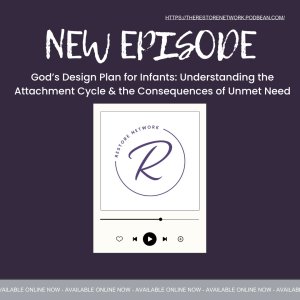
Tuesday Feb 25, 2025
Tuesday Feb 25, 2025
You've heard us talk a lot of about your child's need for true healing, how to create a healing environment, and how you are the most important healing agent in your child's life. But what exactly is it that needs to be healed? To understand what was broken, we need to first understand God's intended design plan for the experience of an infant and the lesson of the first year of life: trust.
Then we need to understand that for the vast majority of children whose lives have intersected with the foster care system, they actually didn't learn trust in the first year of life but rather mistrust and their brains were wired together for protection, instead of connection.
In this week's conversation, we lay out the problem, and in next week's conversation we'll start to build a plan together for going back to the first year of life and dealing with these unmet needs. How do we move a brain from protection mode to connection mode...more on this next week!
Episode references:
Connected Child Book-Chapter 2: https://www.amazon.com/Connected-Child-healing-adoptive-family/dp/0071475001
"What is the Attachment Cycle?" short video with cycle imagery by Empowered to Connect: https://www.youtube.com/watch?v=azUol3w_AIY
TBRI: Attachment Animate: https://www.youtube.com/watch?v=nIhATiiM-Pw
Becoming Trauma Informed: Attachment, online training course https://therestorenetwork.thinkific.com/courses/attachment
The Power of Showing Up by Daniel Siegel & Tina Payne Bryson: https://www.amazon.com/Power-Showing-Up-Parental-Presence/dp/1524797715
The Body Keeps the Score by Bessel Van Der Kolk: https://www.amazon.com/Body-Keeps-Score-Healing-Trauma/dp/0143127748
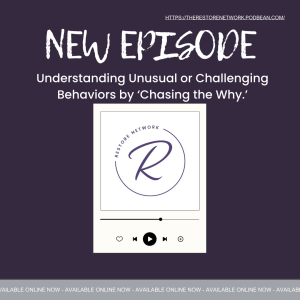
Sunday Feb 16, 2025
Sunday Feb 16, 2025
In last week's conversation, we encouraged foster/adoptive parents to see yourself as the most important healing agent in the life of the child you are caring for and to find the kind of community providers that bring you into the healing process and support you in your caregiver role. In this conversation, we give you a practical first step in navigating those confusing or challenging behaviors, 'Chasing the Why.'
Whether you are a foster/adoptive parent, a volunteer caring for a foster family, a church partner caring for a youth in your congregation, or another community member struggling with the behaviors of a youth you are in relationship with, this can be such a helpful practice!
'Chasing the why' means we lean in to better understand our kids, we bring them close to observe, we document what we see, then we put our detective hats on and look for triggers and patterns that help the confusing or challenging behavior make more sense. Then we relationally or environmentally make changes and work with our kids to grow skills they're missing all of which leads to changed behaviors and healing.
Episode references:
Connected Child Book-Chapter 1, page 9: https://www.amazon.com/Connected-Child-healing-adoptive-family/dp/0071475001
Becoming Trauma Informed: An Introduction training module: https://therestorenetwork.thinkific.com/courses/introduction
Behavior Iceberg: https://parentswithconfidence.com/product/iceberg-behavior-visual-18-x-24-poster/?add-to-cart=4687
Regulation Series Parts 1-8:
Awareness Brings Empathy-Part 1: https://therestorenetwork.podbean.com/e/supporting-regulation-awareness-brings-empathy/
Identifying the Stress Response-Part 2: https://therestorenetwork.podbean.com/e/supporting-regulation-identifying-the-stress-response/
Identifying Triggers-Part 3: https://therestorenetwork.podbean.com/e/supporting-regulation-identifying-triggers/
Making a Safety Plan for your Whole Family-Part 4: https://therestorenetwork.podbean.com/e/supporting-regulation-making-a-safety-plan-for-your-whole-family/
Taking Care of Your Own Nervous System-Part 5: https://therestorenetwork.podbean.com/e/supporting-regulation-taking-care-of-your-own-nervous-system/
Proactive Strategies-Part 6: https://therestorenetwork.podbean.com/e/proactive-strategies-for-supporting-regulation-part-6/
Keeping Behaviors Low & Returning to Calm-Part 7: https://therestorenetwork.podbean.com/e/supporting-regulation-keeping-behaviors-low-returning-to-calm/
When Behaviors are Scary & Where to Get Help-Part 8: https://therestorenetwork.podbean.com/e/supporting-regulation-when-behaviors-are-scary-and-where-to-get-help/
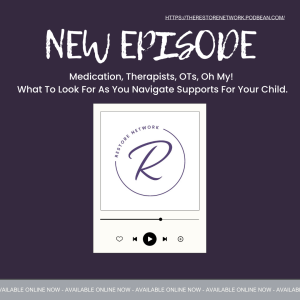
Monday Feb 10, 2025
Monday Feb 10, 2025
When you're a foster parent and you're struggling with a youth in your care and you reach out to your casework team for help, it's not uncommon to receive a response with two limited options: medication or talk therapy. While it's possible that one or both of these tools will provide a baseline of regulation needed for your youth to grow and heal, it's also true that YOU can be a healing agent in the life of your child. In this episode, we'll recognize medication as helpful but also a tool that has to be used alongside the safety and trust of a caring adult relationship. We'll explore traditional talk therapy options and what to look for in a provider-hint, it's one that includes the caregiver in the healing relationship and doesn't point the finger at the child as the problem. Then we'll share our favorite professional support for foster families-occupational therapy!
Episode references:
Connected Child Book-Chapter 1: https://www.amazon.com/Connected-Child-healing-adoptive-family/dp/0071475001
TBRI Professionals Near You: https://child.tcu.edu/tbri-practitioner-list/#sthash.fCkdYAwU.dpbs
Theraplay: https://theraplay.org/
Adoption Support and Preservation Program: https://www.brightpoint.org/strong-families/mental-health-wellness/community-based-services/
All Things Sensory Podcast by Harkla (an entire podcast about all the ways that Occupational Therapists can help): https://harkla.co/blogs/podcast
OT provider list for families in the counties we serve-email abennett@therestorenetwork.org
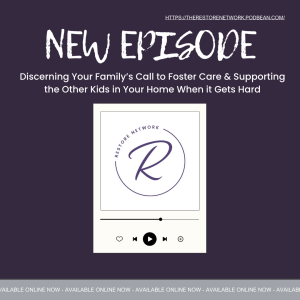
Tuesday Feb 04, 2025
Tuesday Feb 04, 2025
In this episode, we explore foster care as family ministry and how everyone needs to be willing to welcome a child into the home before we move forward. We share with you some of the patterns we see that lead to family's disrupting children from their home and encourage you to consider the children your family would be the best fit for. We give you some things to talk about as a family, inviting you to imagine the change your family will experience and figure out your family's "why"-the thing that will unite you together when it gets hard. Notice we didn't say if but when! Your family WILL experience the costs associated with entering into the hard and burdening yourself on behalf of someone else. When it gets tough, it's time to reach out to your people and lean in to care for the other children in your home so your whole family navigates this season of hard supporting one another. Because hard doesn't mean wrong. And in fact, it might be proof that you are exactly where God wants you to be.
Episode references:
Supporting our Children After a New Placement resource booklet/audio recording: https://therestorenetwork.org/supporting-our-children-after-a-new-placement/
Unpacking What We Bring to the Relationship training module: https://therestorenetwork.thinkific.com/courses/whatwebring
Connected Child Book: https://www.amazon.com/Connected-Child-healing-adoptive-family/dp/0071475001
What Happened to You Book: https://www.amazon.com/What-Happened-You-Understanding-Resilience/dp/1250223180
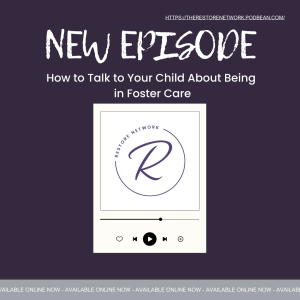
Monday Jan 27, 2025
Monday Jan 27, 2025
In this episode, we talk about the importance of open, honest, and accurate conversations with our children about their stories. Why are they in foster care? Who are we to them? What is going to happen next? You are encouraged to talk with your child soon after you meet them in ways that are age and developmentally appropriate and to keep the conversations going throughout their time with you. Our children should always have access to their stories and no part should be withheld from them ever-even the hard parts. The trick is to do so in ways that are appropriate for their age and development and to protect them from unnecessary harm as you navigate the foster care journey together.
Episode references:
Maybe Days: A Book For Children in Foster Care: https://www.amazon.com/-/es/Maybe-Days-Book-Children-Foster/dp/1557988021
Talking to Your Children About Foster Care & Adoption templates-email abennett@therestorenetwork.org for access.
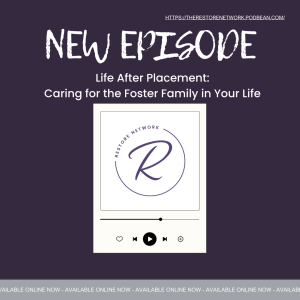
Tuesday Jan 21, 2025
Tuesday Jan 21, 2025
In this episode, we talk about life after placement for those of you who are supporting a foster family in your life. This episode is for extended family, friends, & church communities who are watching someone in your life welcome a child through foster care and wondering how you can help! How can you offer your prayers, tangible supports, understanding & encouragement to lift up a family as they do the hard work God has called them to and how do you respond and stay in the game with them when it gets hard (because it will)!
Episode references:
How Your Church Can Support Foster Families: https://www.canva.com/design/DAF4MfFb0X0/pRSUwAaofCDSYM_0TvG-Gw/view?utm_content=DAF4MfFb0X0&utm_campaign=designshare&utm_medium=link&utm_source=viewer
Trauma-Informed Children's Ministry Book: https://www.amazon.com/Trauma-Informed-Childrens-Ministry-Practical-Reaching/dp/1666715743
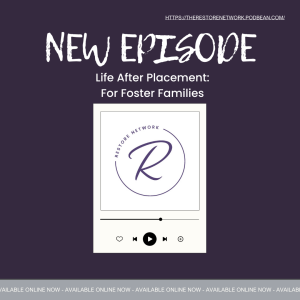
Tuesday Jan 21, 2025
Tuesday Jan 21, 2025
In this episode, we talk about life after placement. When you welcome a child into your home through foster care, you don’t just have a new child but a whole new family. What needs to happen in those first few months so you’ll have the margin to meet your family’s needs? What does your new child need? We’ll talk about the need to simplify and slow life down, invite predictability, cocoon and build trust, study and observe your new child, and explore your own motivations and expectations about foster care, which at this point will likely need adjusting!
Episode references:
https://therestorenetwork.org/life-after-placement-2/
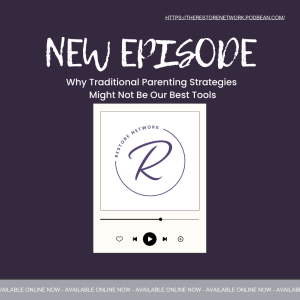
Monday Jan 13, 2025
Monday Jan 13, 2025
In this episode we take a look at traditional parenting strategies and why they may not be the best tools in our toolbox for raising kids with histories of relational and complex developmental trauma (spanking, time-outs, lectures, consequences/punishments, and reward charts covered!).
If you are a foster/adoptive parent, a volunteer who supports our families, a church partner, or a child welfare worker, please join us in this new series of conversations created specifically for you and your role in changing the culture of foster care in Illinois.
Episode References:
https://therestorenetwork.org/why-traditional-parenting-might-not-work/
